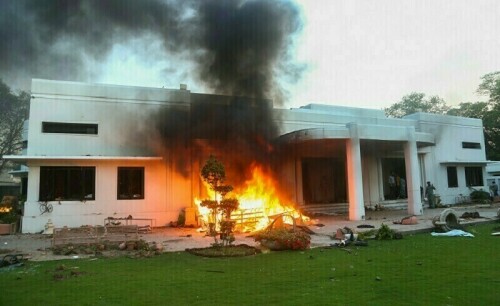ISLAMABAD, Oct 22: As the international financial crisis aggravates, the World Bank has predicted a significant slowdown in Pakistani and Indian growth prospects for 2009-10.
According to a new report of the bank released here on Wednesday, the global financial crisis is hitting South Asia at a time when it is already reeling from adverse effects of a severe terms-of-trade shock.
Pakistan’s economy is already facing difficulties and the global crisis will aggravate it. India’s prospects will be hurt by a reduction in capital flows and possible slowdown in the growth of exports.
The report titled, “Global Financial Crisis: Implications for South Asia”, said the onset of the global financial crisis suggested a significant slowdown in South Asia’s growth prospects for 2009-10, but Pakistan was much more fragile and faced the most vulnerability in the region.
High fiscal and current account deficits, rapid inflation, low reserves, a weak currency and a declining economy have put Pakistan in a very difficult situation.
The country’s ability to borrow externally is already heavily constrained and bond spreads are very high. The global financial crisis means that non-official foreign capital flows will be even more expensive than now.
The contagion effects on domestic financial sector could be substantial, but stress tests suggest that the banking sector as a whole is likely to withstand the shocks. This is mainly due to the improved health of the financial sector based on past reforms.
According to the report, Pakistan and India actually gained from the increase in global commodity demands being significant rice exporters, while other South Asian countries suffered a huge loss of income from a severe terms-of-trade shock because of a surge in global commodity prices.
Pakistan suffered the most rapid deterioration in the current account balance, which turned from a surplus of around four per cent of the GDP in 2003 to a deficit of over eight per cent in 2008.
Sri Lanka also registered a sharp increase in the current account deficit. In India, the current account balance widened sharply from a surplus of more than two per cent of the GDP in 2004 to a deficit of over three per cent in 2008. Only Bangladesh continued to enjoy a surplus in its current account balance.The fiscal deficit in Pakistan widened from 2.4 per cent of the GDP in 2004 to 7.4 per cent in 2008. India had made good progress in reducing fiscal deficit between 2003 and 2007. This progress was reversed in 2008 because of a sharp increase in fuel subsidies.
In Afghanistan, Sri Lanka, Pakistan, Bangladesh and Nepal, food prices made a bigger impact on inflation than fuel. The combined effects of lower food and fuel prices along with demand management are reducing inflationary pressure in most South Asian countries, except Pakistan.
The report said the global financial crisis would likely worsen these trends, particularly on the growth and balance of payments front. This will adversely affect South Asian exports and could hurt income from remittances. Lower foreign capital flows and harder terms will reduce domestic investment. Both will lower growth prospects.
The growing fiscal deficits due to food and fuel subsidies and rising inflation suggest that South Asian countries have basically run out of fiscal space and do not have the option of riding out further shocks with expansionary fiscal and monetary policies.So, in the near term growth will need to fall to absorb the shock from the financial crisis. The policy option of full pass-through of fuel and fertiliser prices to consumers is not politically viable, although further reduction in gap between domestic and international prices and better targeting of open-ended subsidies are possible options, especially in Pakistan which faces the largest macroeconomic imbalances.
The World Bank report said that on the balance of payments side, the flexibility of the exchange rate had been a positive factor, although this had happened only recently in Pakistan. However, further tightening of demand, especially in Pakistan and Sri Lanka, will be necessary.
Over the medium term, there is substantial scope for domestic resource mobilisation through the tax system that will play a key role in regaining the growth momentum. All South Asian countries can benefit from it.
In the short term, countries have tended to cut development spending to contain the rise in fiscal deficits which is contributing to slowdown in growth. The better expenditure management, the report said, was also a medium-term option for reconciling stabilisation with growth objectives.













































Dear visitor, the comments section is undergoing an overhaul and will return soon.